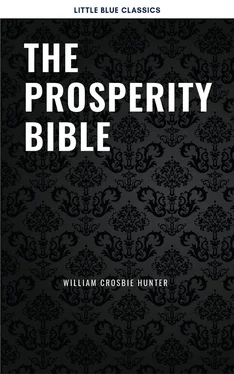Advertising will help to establish your reputation—it is "up to you" to maintain it. One speaker found that his reputation as a magazine writer was a splendid asset as a speaker. Mr. Bryan's publicity, gained by three nominations for the presidency and his position as Secretary of State, helps him to command large sums as a speaker. But—back of it all, he is a great speaker. Newspaper announcements, all kinds of advertising, formality, impressive introductions, all have a capital effect on the attitude of the audience. But how ridiculous are all these if a toy pistol is advertised as a sixteen-inch gun!
Note how authority is used in the following to support the strength of the speaker's appeal:
Professor Alfred Russell Wallace has just celebrated his 90th birthday. Sharing with Charles Darwin the honor of discovering evolution, Professor Wallace has lately received many and signal honors from scientific societies. At the dinner given him in London his address was largely made up of reminiscences. He reviewed the progress of civilization during the last century and made a series of brilliant and startling contrasts between the England of 1813 and the world of 1913. He affirmed that our progress is only seeming and not real. Professor Wallace insists that the painters, the sculptors, the architects of Athens and Rome were so superior to the modern men that the very fragments of their marbles and temples are the despair of the present day artists. He tells us that man has improved his telescope and spectacles, but that he is losing his eyesight; that man is improving his looms, but stiffening his fingers; improving his automobile and his locomotive, but losing his legs; improving his foods, butlosing his digestion. He adds that the modern white slave traffic, orphan asylums, and tenement house life in factory towns, make a black page in the history of the twentieth century.
Professor Wallace's views are reinforced by the report of the commission of Parliament on the causes of the deterioration of the factory-class people. In our own country Professor Jordan warns us against war, intemperance, overworking, underfeeding of poor children, and disturbs our contentment with his "Harvest of Blood." Professor Jenks is more pessimistic. He thinks that the pace, the climate, and the stress of city life, have broken down the Puritan stock, that in another century our old families will be extinct, and that the flood of immigration means a Niagara of muddy waters fouling the pure springs of American life. In his address in New Haven Professor Kellogg calls the roll of the signs of race degeneracy and tells us that this deterioration even indicates a trend toward race extinction.
–Newell Dwight Hillis.
From every side come warnings to the American people. Our medical journals are filled with danger signals; new books and magazines, fresh from the press, tell us plainly that our people are fronting a social crisis. Mr. Jefferson, who was once regarded as good Democratic authority, seems to have differed in opinion from the gentleman who has addressed us on the part of the minority. Those who are opposed to this proposition tell us that the issue of paper money is a function of the bank, and that the government ought to go out of the banking business. I stand with Jefferson rather than with them, and tell them, as he did, that the issue of money is a function of government, and that the banks ought to go out of the governing business.
–William Jennings Bryan.
Authority is the great weapon against doubt, but even its force can rarely prevail against prejudice and persistent wrong-headedness. If any speaker has been able to forge a sword that is warranted to piece such armor, let him bless humanity by sharing his secret with his platform brethren everywhere, for thus far he is alone in his glory.
There is a middle-ground between the suggestion of authority and the confession of weakness that offers a wide range for tact in the speaker. No one can advise you when to throw your "hat in the ring" and say defiantly at the outstart, "Gentlemen, I am here to fight!" Theodore Roosevelt can do that—Beecher would have been mobbed if he had begun in that style at Liverpool. It is for your own tact to decide whether you will use the disarming grace of Henry W. Grady's introduction just quoted (even the time-worn joke was ingenuous and seemed to say, "Gentlemen, I come to you with no carefully-palmed coins"), or whether the solemn gravity of Mr. Bryan before the Convention will prove to be more effective. Only be sure that your opening attitude is well thought out, and if it change as you warm up to your subject, let not the change lay you open to a revulsion of feeling in your audience.
Example is a powerful means of suggestion. As we saw while thinking of environment in its effects on an audience, we do, without the usual amount of hesitation and criticism, what others are doing. Paris wears certain hats and gowns; the rest of the world imitates. The child mimics the actions, accents and intonations of the parent. Were a child never to hear anyone speak, he would never acquire the power of speech, unless under most arduous training, and even then only imperfectly. One of the biggest department stores in the United States spends fortunes on one advertising slogan: "Everybody is going to the big store." That makes everybody want to go.
You can reinforce the power of your message by showing that it has been widely accepted. Political organizations subsidize applause to create the impression that their speakers' ideas are warmly received and approved by the audience. The advocates of the commission-form of government of cities, the champions of votes for women, reserve as their strongest arguments the fact that a number of cities and states have already successfully accepted their plans. Advertisements use the testimonial for its power of suggestion.
Observe how this principle has been applied in the following selections, and utilize it on every occasion possible in your attempts to influence through suggestion:
The war is actually begun. The next gale that sweeps from the North will bring to our ears the clash of resounding arms. Our brethren are already in the field. Why stand ye here idle?
–Patrick Henry.
With a zeal approaching the zeal which inspired the Crusaders who followed Peter the Hermit, our silver Democrats went forth from victory unto victory until they are now assembled, not to discuss, not to debate, but to enter up the judgment already rendered by the plain people of this country. In this contest brother has been arrayed against brother, father against son. The warmest ties of love, acquaintance, and association have been disregarded; old leaders have been cast aside when they refused to give expression to the sentiments of those whom they would lead, and new leaders have sprung up to give direction to this cause of truth. Thus has the contest been waged, and we have assembled here under as binding and solemn instructions as were ever imposed upon representatives of the people.
–William Jennings Bryan.
Figurative and indirect language has suggestive force , because it does not make statements that can be directly disputed. It arouses no contradictory ideas in the minds of the audience, thereby fulfilling one of the basic requisites of suggestion. By implying a conclusion in indirect or figurative language it is often asserted most forcefully.
Note that in the following Mr. Bryan did not say that Mr. McKinley would be defeated. He implied it in a much more effective manner:
Mr. McKinley was nominated at St. Louis upon a platform which declared for the maintenance of the gold standard until it can be changed into bimetallism by international agreement. Mr. McKinley was the most popular man among the Republicans, and three months ago everybody in the Republican party prophesied his election. How is it today? Why, the man who was once pleased to think that he looked like Napoleon—that man shudders today when he remembers that he was nominated on the anniversary of the battle of Waterloo. Not only that, but as he listens he can hear with ever-increasing distinctness the sound of the waves as they beat upon the lonely shores of St. Helena.
Читать дальше












